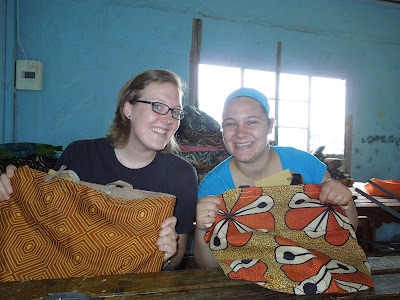This book challenged me and left me feeling inspired to continue to explore what it means to live a life of compassion. I learned a lot from Nowen, McNeill, and Morrison's writings but the funny thing was that as I read their book I almost missed the perfect examples of compassion that have surronded me here in Swaziland.
"The word compassion is derived from the Latin words pati and cum, which together mean "to suffer with." Compassion asks us to go where it hurts, to enter into places of pain, to share in brokenness, fear, confusion, and anguish. Compassion challenges us to cry out with those in misery, to mourn with those who are lonely, to weep with those in tears. Compassion requires us to be weak with the weak, vulnerable with the vulnerable, and powerless with the powerless. Compassion means full immersion in the condition of being human. When we look at compassion this way, it becomes clear that something more is involved than a general kindness or tenderheartedness." (Page 4)
This week one of my friends here in Swaziland had a still birth. Over the last few days I have witnessed their family and friends gather around this young couple to mourn the death of their unborn child. Last night a dozen or so people gathered at the father's homestead to mourn. This may be a cultural tradition but it is also provides us with a glimpse of the fellowship of believers that we read about in Acts 2.
Yesterday, one of the gogos from Timbali saw Titi (the father's sister and mother's best friend) crying about the situation. I don't know if this gogo knew what Titi was crying about but upon seeing Titi's saddness the gogo instantly engulfed Titi in a hug and starting whispering a prayer into Titi's ear. This is compassion.
"Many people tend to associate prayer with separation from others, but real prayer brings us closer to our fellow human beings. Prayer is the first and indispensible discipline of compassion precisely because prayer is also the first expression of human solidarity. Why is this so? Because the Spirit who prays in us is the Spirit by whom all human beings are brought together in unity and community. The Holy Spirit, the Spirit of peace, unity, and reconciliation, constantly reveals himself to us as the power through whom people from the most diverse social, political, economic, racial, and ethnic backgrounds are brought together as sisters and brothers of the same Christ and daughters and sons of the same Father.Death is very common in Swaziland, in fact this is a nation with one of the lowest life expectancy rates. A third example of compassion I saw yesterday was seeing another friends response to hearing about the recent death. He knows a few of the family members but does not directly know the Mother or the Father of the baby. Despite not knowing them or even knowing much about the situation he was moved to tears as we arrived at the homestead and saw the mourning family members. His response to death, especially in a place where death is so common, was compassion. Once again on this trip I found myself reminded of 1st Corinthians 12:26. "If one member suffers, all suffer together with it; if one member is honored, all rejoice together with it."
To prevent ourselves from slipping into spiritual romanticism or pious sentimentality, we must pay careful attention to the compassionate presence of the Holy Spirit. The intimacy of prayer is the intimacy created by the Holy Spirit who, as the bearer of the new mind and the new time, does not exclude but rather includes our fellow human beings. In the intimacy of prayer, God reveals himself to us as the God who loves all the members of the human family just as personally and uniquely as he loves us. Therefore, a growing intimacy with God deepens our sense of responsibility for others. It evokes in us an always increasing desire to bring the whole world with all its suffering and pains around the divine fire in our heart and to share the revitalizing heat with all who want to come. But it is precisely this desire that requires such deep and strong patience." (Pages 108-109)
"The great news we have recieved is that God is a compassionate God. In Jesus Christ the obedient servant, who did not cling to his divinity buy emptied himself and became as we are, God has revealed the fullness of his compassion. He is Immanuel, God-with-us. The great call we have heard is to live a compassionate life. In the community formed in displacement and leading to a new way of being together, we can become disciples-living manifestations of God's presence in this world. The great task we have been given is to walk the compassionate way.Through the discipline of patience, practiced in prayer, and action, the life of discipleship becomes real and fruitful." (page 130)





.JPG)
